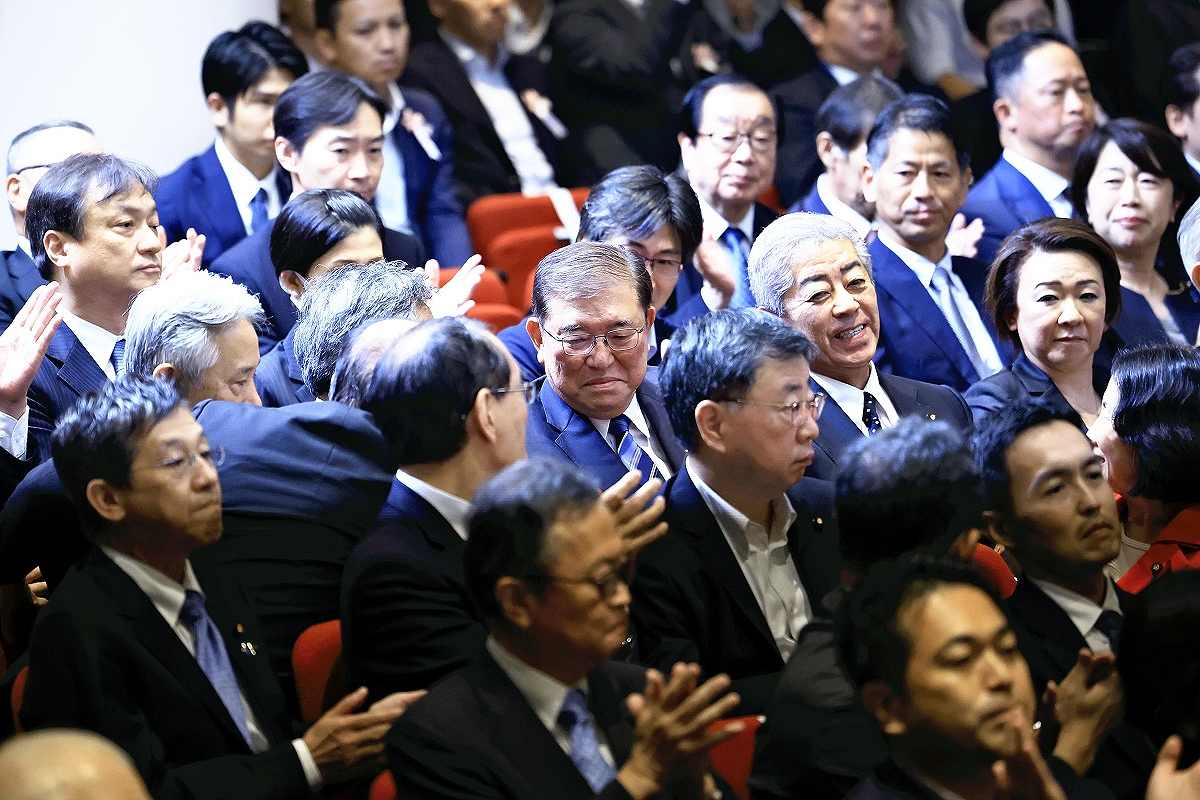LDP President Ishiba Changes Position on Snap Elections, Seeks Early Victory

Newly elected Liberal Democratic Party President Shigeru Ishiba, center, is seen at the party’s headquarters on Friday.
18:09 JST, September 30, 2024
With Oct. 27 set for a general election, the Liberal Democratic Party’s newly elected President Shigeru Ishiba wants to use his administration’s momentum to secure an early victory.
The decision to hold the election soon was based on advice from senior party members, including Hiroshi Moriyama, who is the LDP’s new secretary general.
Ishiba’s appointments for party executives and his cabinet are said to reflect the views of former prime ministers and to reward those who supported him in the party’s presidential election. It remains to be seen whether these choices will be met with public approval.
Making his case
“I believe it’s better to seek a public mandate for the new administration as early as possible,” Ishiba said on a Fuji Television program on Sunday.
At an extraordinary Diet session set for Tuesday, Ishiba said he would “present material” that would help the public decide who to vote for, specifically in debates against other parties’ leaders.
His remarks suggest he will give a policy speech at the Diet on Friday, answer questions from representatives of each party and debate the opposition party leaders before dissolving the House of Representatives.
Ishiba hopes to dissolve the lower house on Oct. 9 and make his diplomatic debut at an Association of Southeast Asian Nations related summit scheduled for Oct. 10-11 in Laos.
Change in attitude
While campaigning for LDP president, Ishiba had at times shown caution about dissolving the lower house in the near term.
“I’m not going to say, ‘I’ll dissolve the lower house right away’ when It’s not clear what could happen in global affairs,” he said in a debate on Sept. 14.
Article 69 of the Constitution states that the cabinet shall resign en masse or the lower house shall be dissolved when a no-confidence motion is passed. Some argue that this is the only proper way the lower house can be dissolved. On the other hand, Article 7 of the Constitution states that the Emperor can dissolve the lower house with the advice and approval of the cabinet. In reality, Article 7 has often been used to dissolve the lower house.
Ishiba has been critical of the so-called Article 7 dissolutions, which allow the prime minister to choose the timing of the next election. He said in a blog post dated June 9, 2023, “Dissolution should not be carried out for the purpose of prolonging the life of an administration or for party interests.”
But on Sunday’s program, Ishiba said, “A new administration has been formed that has not been decided on by the public. Asking the people to pass judgment on it is in accordance with the intent of Article 69.”
In response, Constitutional Democratic Party of Japan leader Yoshihiko Noda said: “I’m not convinced at all. That’s completely different” from what he said before.
Advantage of early dissolution
In accepting the LDP’s post of secretary general, Moriyama explained to Ishiba the advantage of dissolving the lower house as soon as possible. Namely, that the party can ride the momentum from its leadership race. This is believed to have pushed Ishiba toward an early dissolution.
Prime Minister Fumio Kishida and former Prime Minister Yoshihide Suga shared Moriyama’s view. Komeito was also seeking an early general election, in light of next summer’s House of Councillors election. This also influenced Ishiba’s decision.
In many cases, a cabinet’s approval rating tends to be highest immediately after its inauguration and then gradually decline due to scandals involving cabinet members and other factors.
Taro Aso, who became prime minister in September 2008, initially enjoyed a high approval rating but missed the optimal time to dissolve the lower house and was forced to do so just before the end of the term for lower house members. The LDP ended up suffering a crushing defeat in the subsequent election, leading to a change in government.
The current term for lower house members is set to expire in October 2025. Many within the LDP are concerned, with one party member saying, “We must avoid a repeat of the Aso administration.”
Related Tags
Top Articles in Politics
-

Japan PM Takaichi’s Cabinet Resigns en Masse
-

Sanae Takaichi Elected 105th Prime Minister of Japan; Keeps All Cabinet Appointees from Previous Term
-

Japan’s Govt to Submit Road Map for Growth Strategy in March, PM Takaichi to Announce in Upcoming Policy Speech
-

LDP Wins Historic Landslide Victory
-

LDP Wins Landslide Victory, Secures Single-party Majority; Ruling Coalition with JIP Poised to Secure Over 300 seats (UPDATE 1)
JN ACCESS RANKING
-

Japan PM Takaichi’s Cabinet Resigns en Masse
-

Japan Institute to Use Domestic Commercial Optical Lattice Clock to Set Japan Standard Time
-

Israeli Ambassador to Japan Speaks about Japan’s Role in the Reconstruction of Gaza
-

Man Infected with Measles Reportedly Dined at Restaurant in Tokyo Station
-

Man Infected with Measles May Have Come in Contact with Many People in Tokyo, Went to Store, Restaurant Around When Symptoms Emerged


















